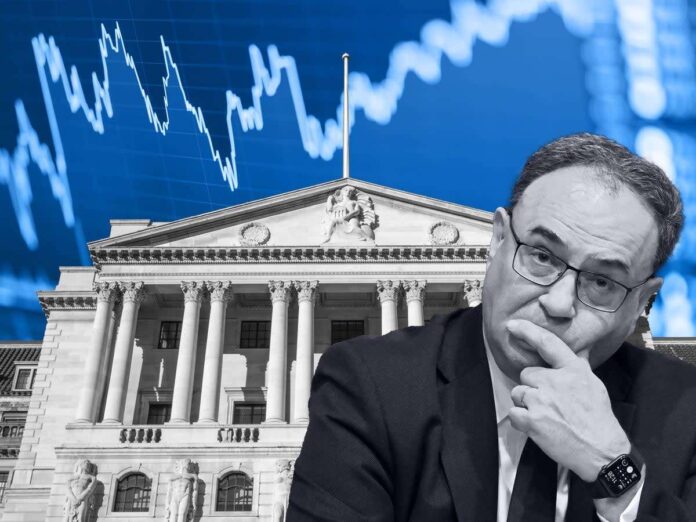The Bank of England is likely to hike interest rates for the 13th time in a row later this year to combat increasing prices. Official data released on Wednesday indicated that inflation, or the annual rate at which prices rise, remained at 8.7% in May. This has increased the likelihood of the Bank raising its benchmark rate from 4.5% to 5%. Despite disputes over its efficiency, interest rates remain its major weapon for lowering inflation. Analysts believe an increase to 4.75% is most likely, but a more significant increase to 5% is still possible, however, one economist believes such a jump would indicate that the Bank has “completely lost control of inflation.” Any such move would cause further hardship for some homeowners, but it could benefit savers.
The bank rate has already reached its highest level in roughly 15 years, climbing steadily since December 2021 in reaction to growing living costs. The premise goes that boosting interest rates makes borrowing money more expensive, which means people have less money to spend, lowering demand and hence moderating price rises. A new increase is anticipated to be announced at noon BST on Thursday, following a meeting of the Bank’s Monetary Policy Committee, which makes the decision independently of the government.
Former Bank of England deputy governor for monetary policy, Sir Charlie Bean, told the BBC’s Today programme that if he were on the committee, he would “probably” vote for a 0.5% increase.”The news on inflation has been unambiguously bad since the last meeting,” he remarked. “You’ve had two bad inflation releases, and the labor market release showed pay growth much stronger than expected – you put all of that together, and it’s a pretty clear signal that more rate increases are needed.” Sir Charlie stated that the dilemma for the Bank was whether to take a “big step today, or a smaller step, but perhaps indicating that more [rate rises] are on the way.”
Economy Faces Inflation Risks Amidst Interest Rate Decisions and Government Commitments
According to Luke Hickmore, investment director at Abrdn, there is a “large risk” of a 0.5% increase, but if the Bank does so, it “may send the wrong message to the markets that it has completely lost control of inflation. Prime Minister Rishi Sunak will recommit to halving inflation by the end of the year in a speech scheduled to be delivered immediately after the decision is revealed, saying he has a “deep moral responsibility to ensure the money you earn holds its value.” He is likely to say at a business gathering in the southeast of England that he is “completely confident that if we hold our nerve” the objective can be met. Labour’s shadow chancellor Rachel Reeves has slammed the government over the impact of increased interest rates on mortgage holders.
Before the rate decision, she criticized the Tories for engaging in disputes over peerages and parties instead of taking responsibility and implementing measures to address mortgage concerns. On Wednesday, the Office for National Statistics reported that inflation remained constant from the previous month at 8.7%. Analysts who had expected it to decrease were taken aback. Higher pricing for flights and used automobiles drove the surprising figure, but retail food prices also continued to grow significantly.
So-called “core” inflation, which excludes volatile items such as direct energy and food prices, as well as alcohol and tobacco prices, rose at the quickest rate in 31 years last month. According to economists, this distinguishes the UK from other countries where inflation is declining, such as the United States and Germany.
The mortgage bomb
A variety of loans might become more expensive as interest rates climb. More than 1.4 million consumers with tracker and variable rate mortgages typically experience an increase in their monthly payments right away.
The hike in the Bank rate from 4.5% to 4.75% would result in an extra £24 a month for those on a typical tracker mortgage. Those with normal variable rate mortgages would see a £15 increase. This is on top of the increases resulting from the prior rate hikes. In comparison to pre-December 2021, average tracker mortgage customers would pay around £441 more per month, and variable rate mortgage holders would pay approximately £282 more.
If the rate rises to 5%, people with a typical tracker mortgage will pay an extra £47 monthly. Those with normal variable rate mortgages will see a £30 increase. A fixed-rate mortgage is held by eight out of ten mortgage clients. Their monthly payments may not alter immediately, but home buyers or those looking to refinance will experience a significant increase in repayments when they switch to a new agreement.
The so-called “mortgage bomb” has grown into a major economic and political concern. The average two-year fixed rate, which was 2.29% in November 2021, has already risen to more than 6%.













